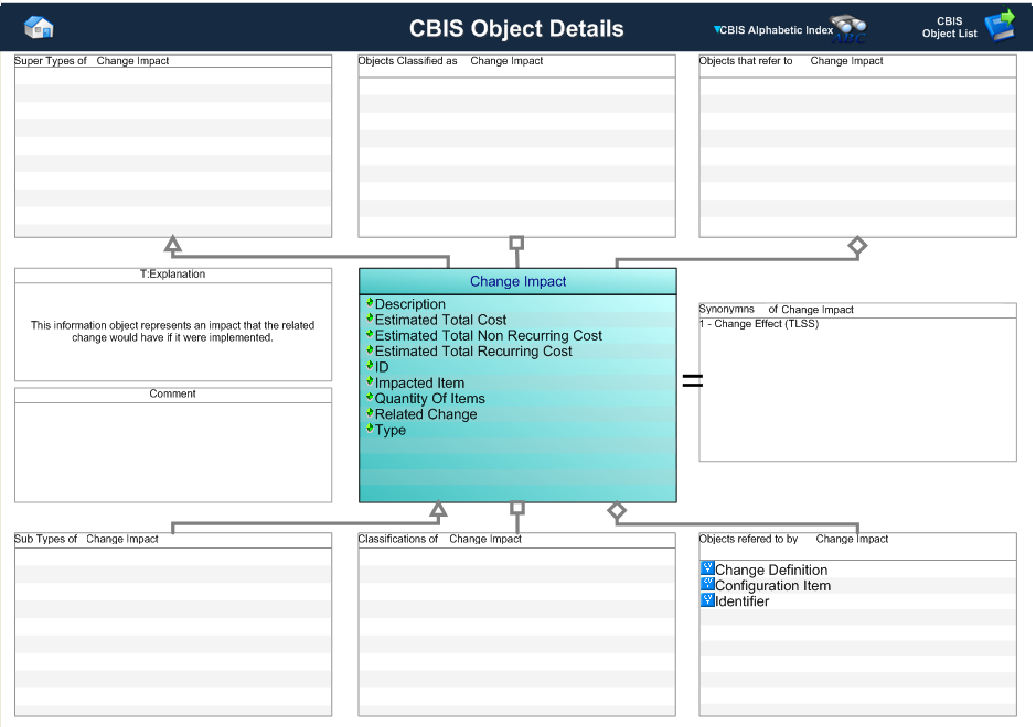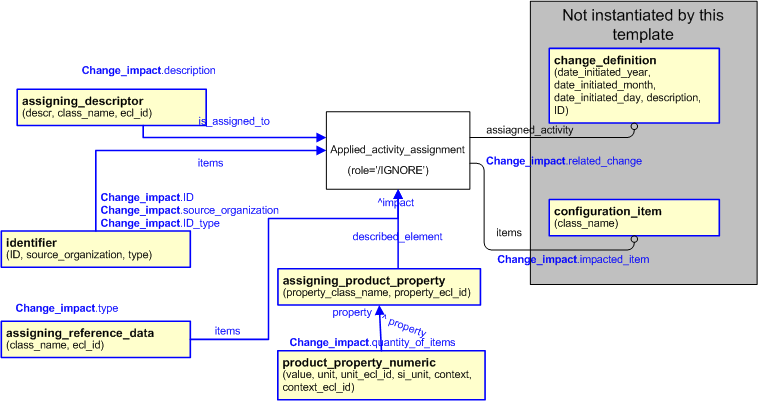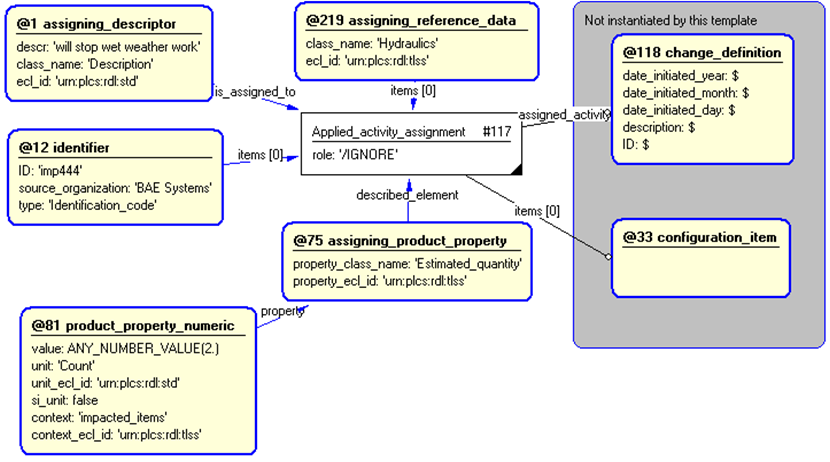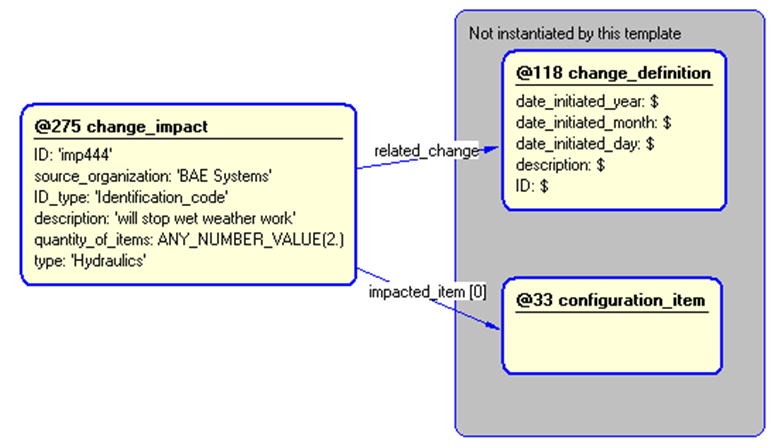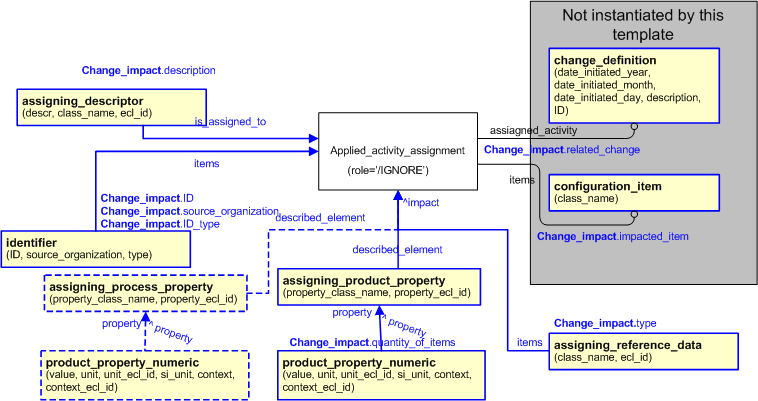Template:— change_impact (chg_impt)
Context:— UK_Defence |
Date: 2009/04/17 10:30:39
Revision: 1.2
|
This section specifies the template change_impact.
NOTE
The template has been defined in the context of
UK_Defence.
Refer to the business context for details of related templates.
NOTE
An explanation of a template and the associated instantiation path is
provided in the
Template overview
section.
This template describes how to represent a UK_Defence change impact, using
Applied_activity_assignment
This information object represents an impact that the related change would have if it were implemented.
For further information about the representation of a change impact, see below.
This information object represents an impact that the related change would have if it were implemented.
Figure 1 — Graphical Representation for Business Object change impact
This information object represents the information about a physical instance of a change impact.
|
Attribute name
|
Attribute description
|
Attribute type
|
Optionality
|
| Description |
This is the description of the impact that the Related Change will have. |
Intrinsic |
Mandatory |
| Estimated Total Cost |
This is the total estimated cost (recurring and non-recurring) of the Change Impact of the Related Change.
NOTE: This is for the related Quantity Of Items, NOT for each item.
|
Intrinsic |
Optional |
| Estimated Total Non Recurring Cost |
This is the total estimated non recurring cost of the Change Impact of the Related Change.
NOTE: This is for the related Quantity Of Items, NOT for each item.
|
Intrinsic |
Optional |
| Estimated Total Recurring Cost |
This is the total estimated recurring cost of the Change Impact of the Related Change.
NOTE: This is for the related Quantity Of Items, NOT for each item.
|
Intrinsic |
Optional |
| ID |
This is the Identifier of the Change Impact. |
Identifier |
Mandatory |
| Impacted Item |
This is the reference to the item to which the impact relates. |
Configuration Item |
Mandatory |
| Quantity Of Items |
This is the estimated number of units that are affected by the change.
NOTE: That is, the number of items that will have modifications performed on them as a result of the Related Change.
|
Intrinsic |
Mandatory |
| Related Change |
This is the reference to the Change that causes this impact. |
Change definition |
Mandatory |
| Type |
This is the categorization of the Change Impact.
This could be used to classify impacts into categories such as
"Electrical Interfaces - Definition of Main Cable Runs";
"Electrical Interfaces - Definition of Position Cable";
"Electrical Interfaces - Connection Details";
"Compass Transmission";
"Chilled Water";
"Electrical Power";
"Environmental Requirements";
"HP/LP Air";
"Hydraulics";
"Upkeep, Keep Alive Maintenance";
"Seating Details";
"Signals";
"Siting Parameters";
"Ventilation";
"Space Requirements";
"Weapon Equipment";
"Effect on Environment";
"Research-Design-Development", including:
- "research";
- "design-development";
- "functional requirements", including:
* "product performance";
* "functional interface";
* "operational employment";
* "product interoperability";
* "product reliability";
* "product maintainability";
- "physical requirements", including:
* "physical dimensions";
* "weight";
* "moment of inertia";
* "form";
* "fit";
* "material composition";
* "physical interface";
* "finish";
"Product Distribution", including:
- "distribution method", including:
* "packaging";
* "handling";
* "transportability";
- "inspection location";
- "catalogue";
- "availability";
"Product Activation", including:
- "site-facility acquisition";
- "site activation";
- "facility construction";
- "product installation", including:
* "installation procedure:
* "installation assets";
* "facility-equipment interface";
"Product Operation", including:
- "operating procedure";
- "operating software";
- "operational environment";
- "operational training";
- "operational training materials";
- "operational training equipment";
- "operational training software";
"Product Maintenance", including:
- "maintenance plan/concept analysis"; - "maintenance contract";
- "service centres";
- "service warranty";
- "spare/repair parts";
- "supply data";
- "maintenance procedures/manual";
- "maintenance assets";
- "maintenance software";
- "maintenance training";
- "maintenance training materials";
- "maintenance training software";
- "maintenance personnel skill level".
|
Intrinsic |
Mandatory |
Table 1 — Change Impact attribute details
The EXPRESS-G diagram in
Figure
2
shows the templates and EXPRESS entities that are required
to represent the template
"change_impact".
The text highlighted in blue shows the template parameters.
Figure 2 — An EXPRESS-G representation of the Information model for change_impact
The graphic for the template to be used in other EXPRESS-G diagrams
is shown in Figure
3
below.
Figure 3 — The graphical representation of the change_impact template
The following input parameters are defined for this template:
This is the Identifier of the Change Impact.
The organization that created the associated identifier. Additionally
a Person or Information System could be defined when either of these are the source; see Identifier template characterizations
This is the name of the type of the class used to classify the identifier and so
provide the role or reason for the identification.
The following classes and their sub-classes can be used:
This is the reference to the item to which the impact relates.
This is the reference to the Change that causes this impact.
This is the description of the impact that the Related Change will have.
This is the estimated number of units that are affected by the change. The datatype is always 'any_number_value'
and should not be registered together with the value, i.e. enter the
value as a number, without datatype.
This is the categorization of the Change Impact.
The following reference parameters are defined for this template:
%^target = $change_impact.impact%
Allow the
Assigned_property
entity instantiated in this path to be referenced when this template is used.
%^target = $change_impact.property%
The following parameter combinations specify a uniqueness constraint:
Unique constraint: Unique id
Each instance of the
entity
(
Applied_activity_assignment)
within the data set shall be uniquely identified
by a combination of the following parameters on this
template (change_impact) namely:
related_change,
ID.
The
instance is
referenced by the following template parameter:
impact.
The Id and change of the product should only occur once in a data set.
The instantiation path shown below specifies the entities that are to be
instantiated by the template.
A description of templates and the syntax for the instantiation path is
provided in the
Templates Help/Information section.
-- Instantiate an Applied_activity_assignment Applied_activity_assignment-- Bind the Applied_activity_assignment to the reference parameter %^impact =
Applied_activity_assignment%
-- Set the Applied_activity_assignment attribute role to be ignored Applied_activity_assignment.role = '/IGNORE'
Applied_activity_assignment.items ->
@impacted_itemApplied_activity_assignment.assigned_activity ->
@related_change-- instantiate the product role fits identifier /
identifier(
ID=@ID,
source_organization=@source_organization,
type=@ID_type,
items=^impact)/
/
assigning_reference_data(
class_name=@type,
ecl_id='urn:plcs:rdl:uk_defence',
items=^impact)/
/
assigning_descriptor(
descr=@description,
class_name='Description',
ecl_id='urn:plcs:rdl:std',
is_assigned_to=^impact)/
-- assign a book value property to the asset and classify it as 'Cost_property /
assigning_product_property(
property_class_name='Estimated_quantity',
property_ecl_id='urn:plcs:rdl:uk_defence',
described_element=^impact)/
%^property = $assigning_product_property.property%
-- assign a value and unit to the asset's book value property /
product_property_numeric(
value=@quantity_of_items,
unit='Count',
unit_ecl_id='urn:plcs:rdl:std',
si_unit='.false.',
context='Numerical_representation_context',
context_ecl_id='urn:plcs:rdl:std',
property=^property)/
The following entities are instantiated with attributes as specified:
The instance diagram in Figure
4
shows an example of the EXPRESS entities and templates that are instantiated by the template:
/change_impact(ID='imp444', source_organization='BAE Systems', ID_type='Identification_code', impacted_item='@33', related_change='@118', description='will stop wet weather work', quantity_of_items='ANY_NUMBER_VALUE[2]', type='Hydraulics')/
(an illustration of the consolidated change_impact template is shown in
Figure
5 below.)
Figure 4 — Entities instantiated by change_impact template
The instance diagram in
Figure
5
shows the graphic symbol for the template that is to be
used in other instance diagrams. The example template is:
/change_impact(ID='imp444', source_organization='BAE Systems', ID_type='Identification_code', impacted_item='@33', related_change='@118', description='will stop wet weather work', quantity_of_items='ANY_NUMBER_VALUE[2]', type='Hydraulics')/
Figure 5 — Instantiation of change_impact template
The following section details how the
change_impact
template can be optionally characterized by assigning
other constructs to it. These are characterizations commonly
applied to the template. The ISO 10303-239 EXPRESS model may enable
other assignments to the entities instantiated by the template.
The EXPRESS-G diagram in Figure
6
shows the possible characterizations of the template
"change_impact".
Figure 6 — Characterizations for change_impact
The following characterizations may apply:
Characterization Assigning properties
NOTE this characterization is optional.
Properties, e.g. estimated total cost; estimated total non recurring cost; estimated total recurring cost;, can
be assigned to a typical activity.
A property is represented using templates
assigning_process_property
and process_property_numeric.
NOTE
The assignment of process properties are described further in capability C077: assigning_process_properties.
/assigning_process_property(property_class_name='Estimated_total_ cost', property_ecl_id='urn:plcs:rdl:uk_defence', described_element='@117')/
other possible values for property_class_name could be "Estimated_total_non_recurring_cost" and
"Estimated_total_recurring_cost".
/process_property_numeric(value='750', unit='Pound_sterling', unit_ecl_id='urn:plcs:rdl:uk_defence', si_unit='false', context='Numerical_representation_context', context_ecl_id='urn:plcs:rdl:uk_defence', property='@10')/
NOTE
Presuming that the example of template assigning_process_property is given the value @10.
